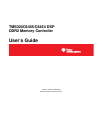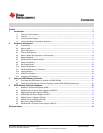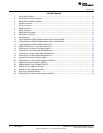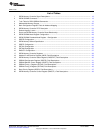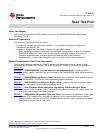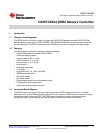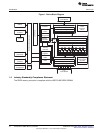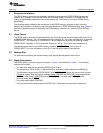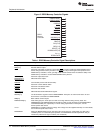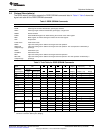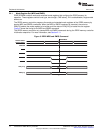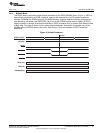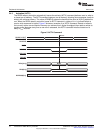
User's Guide
SPRU970G–December 2005–Revised June 2011
C6455/C6454 DDR2 Memory Controller
1 Introduction
1.1 Purpose of the Peripheral
The DDR2 memory controller is used to interface with JESD79-2B standard compliant DDR2 SDRAM
devices. Memory types such as DDR1 SDRAM, SDR SDRAM, SBSRAM, and asynchronous memories
are not supported. The DDR2 memory controller SDRAM can be used for program and data storage.
1.2 Features
The DDR2 memory controller supports the following features:
• JESD79-2B standard compliant DDR2 SDRAM
• 512M byte memory space
• Data bus width of 32 or 16 bits
• CAS latencies: 2, 3, 4, and 5
• Internal banks: 1, 2, 4, and 8
• Burst length: 8
• Burst type: sequential
• 1 CE signal
• Page sizes: 256, 512, 1024, and 2048
• SDRAM autoinitialization
• Self-refresh mode
• Prioritized refresh
• Programmable refresh rate and backlog counter
• Programmable timing parameters
• Little endian and big endian transfers
1.3 Functional Block Diagram
The DDR2 memory controller is the main interface to external DDR2 memory (see Figure 1). Master
peripherals, such as the EDMA controller and the CPU can access the DDR2 memory controller through
the switched central resource (SCR). The DDR2 memory controller performs all memory-related
background tasks such as opening and closing banks, refreshes, and command arbitration.
9
SPRU970G–December 2005–Revised June 2011 C6455/C6454 DDR2 Memory Controller
Submit Documentation Feedback
Copyright © 2005–2011, Texas Instruments Incorporated



